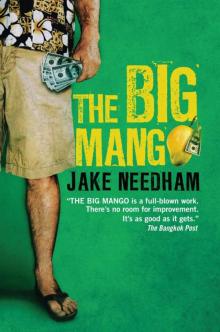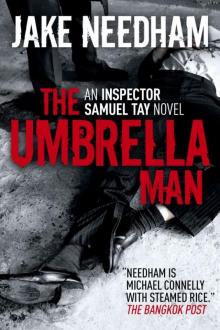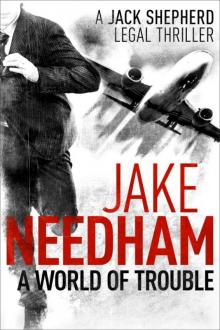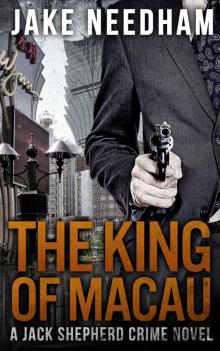- Home
- Needham, Jake
Umbrella Man (9786167611204)
Umbrella Man (9786167611204) Read online
WHAT THE PRESS SAYS ABOUT JAKE NEEDHAM
“In his raw power to bring the street-level flavor of contemporary Asian cities to life, Jake Needham is Michael Connelly with steamed rice.” – The Bangkok Post
“Jake Needham is Asia’s most stylish and atmospheric writer of crime fiction.” – The Singapore Straits Times
“Needham certainly knows where a few bodies are buried.” –Asia Inc.
“Jake Needham has a knack for bringing intricate plots to life. His stories blur the line between fact and fiction and have a ‘ripped from the headlines’ feel…Buckle up and enjoy the ride.” – CNNgo
“Mr. Needham seems to know rather more than one ought about these things.” –The Wall Street Journal
“What you will not get is pseudo-intellectual new-wave Asian literature, sappy relationship writing, or Bangkok bargirl sensationalism. This is top class fiction that happens to be set in an Asian context.” – Singapore Airline SilverKris Magazine
“For Mr. Needham, fiction is not just a good story, but an insight into a country’s soul.” –The New Paper (Singapore)
THE FIRST BOMB cracked the Hilton like an egg; the second gutted the lobby of the Marriott; and the third peeled the front off the Grand Hyatt. Three massive explosions, all at American hotels in the heart of the city, and all within a few horrifying seconds. Hundreds are dead and thousands are injured. Singapore is bleeding.
Inspector Samuel Tay is a senior inspector in the Special Investigation Section of Singapore CID, but he is frozen out of this investigation from the beginning. He’s made serious enemies in Singapore’s Internal Security Department, and he has even more enemies at the American embassy, so Tay is assigned routine cases while his colleagues join with the CIA and the FBI in a feverish search for the bombers.
Three days after the explosions, the smell of death still sticky in the city’s air, Tay is sent to a run-down apartment near the Malaysian border where two children have found the body of a Caucasian male with a broken neck. Tay feels an immediate connection with the dead man, although he doesn’t think he has seen him before.
As Tay searches the dead man’s past for clues to who he was and who his killer might have been, Tay’s own past begins to give up its secrets. A long-dead father he can barely remember reaches out of the grave to point to the truth about both the murdered man and the bombings. And the horror of Singapore’s destruction becomes a personal horror for Samuel Tay.
THE UMBRELLA MAN
An Inspector Samuel Tay Novel
by
Jake Needham
Smashwords edition published by
Half Penny Ltd.
Hong Kong
THE UMBRELLA MAN, copyright © 2013 by Jake Raymond Needham
This e-book is licensed for your personal enjoyment only. It may not be re-sold or given away to other people. If you are reading this book and did not purchase it or it was not purchased specifically for your use, please purchase a copy for yourself. Thank you for respecting the work of the author and the publisher.
Excerpt from THE AMBASSADOR’S WIFE, © 2011 by Jake Raymond Needham
Cover Design by the Stuart Bache Company, London
Cover © 2013 Jake Raymond Needham
Smashwords Edition 978-616-7611-20-4
Smashwords Edition December 2012
Contents
What The Press Says About Jake Needham
Dedication
Epigraph
ONE
TWO
THREE
FOUR
FIVE
SIX
SEVEN
EIGHT
NINE
TEN
ELEVEN
TWELVE
THIRTEEN
FOURTEEN
FIFTEEN
SIXTEEN
SEVENTEEN
EIGHTEEN
NINETEEN
TWENTY
TWENTY-ONE
TWENTY-TWO
TWENTY-THREE
TWENTY-FOUR
TWENTY-FIVE
TWENTY-SIX
TWENTY-SEVEN
TWENTY-EIGHT
TWENTY-NINE
THIRTY
THIRTY-ONE
THIRTY-TWO
THIRTY-THREE
THIRTY-FOUR
THIRTY-FIVE
THIRTY-SIX
THIRTY-SEVEN
THIRTY-EIGHT
THIRTY-NINE
FORTY
FORTY-ONE
FORTY-TWO
FORTY-THREE
FORTY-FOUR
FORTY-FIVE
FORTY-SIX
FORTY-SEVEN
FORTY-EIGHT
FORTY-NINE
FIFTY
FIFTY-ONE
Bonus Preview of THE AMBASSADOR’S WIFE
The Jake Needham Library
Meet Jake Needham
This is for Aey.
Just like everything else.
so now it’s early in the morning
at the longitude of Memphis
and the sun is setting sweetly on Hong Kong
and the big plan is just to keep spinning
‘cause the big bang is only just beginning
and sometimes it’s all that we can do
just to hang on
–‘Garden of Simple’
Ani DeFranco
ONE
SAMUEL TAY PUSHED himself up from the chair and walked over to the French doors that led to his small garden. He opened them and stepped onto the brick pavers in his stocking feet.
Shaking a Marlboro out of the pack in his pocket, he lit it and stood quietly smoking. The fumes made little swirls and eddies in the air and Tay followed them with his eyes.
He was still trying to quit, of course. He was always trying to quit. His best effort to date had been twenty-nine days. Not good, but not that bad either. How he saw it generally depended on whether he was having a glass-half-empty or a glass-half-full kind of day.
This had been a glass-completely-empty kind of day.
And of course Tay didn’t know it yet, but it was just about to get a whole lot worse.
***
Tay lifted his arm and looked at his watch. Later, he would remember it had been exactly 7:55 pm when he heard the sounds.
Two almost simultaneous rumbles off in the distance.
Then, a few seconds later, a third.
BOOM. BOOM.
Pause.
BOOM.
Like that.
Tay lowered his arm and looked around.
Thunder?
He glanced at the sky, or at least at the part of the sky he could see over the houses surrounding his garden. No, it was clear.
Not thunder then. So what had he heard?
It occurred to Tay almost immediately, of course, that it could have been the detonation of bombs.
There had never been a bombing in Singapore, but that did not mean there could not be one. Tay was a police inspector, a twenty-year veteran of the Special Investigations Section of the Criminal Investigations Department of the Singapore Police Department. He had seen more than enough to believe that anything was possible.
Tay lived on Emerald Hill Road, a quiet dead-end street in a sleepy neighborhood of classic row houses. It was an area steeped in dignity and tranquility, yet it was barely a hundred yards from busy Orchard Road. Half of Singapore’s international hotels were on Orchard Road. Alternating with mammoth, multi-story shopping malls, they formed two unbroken ranks of massive structures that lined both sides of the six-lane road for mile after mile. If there were ever to be a bombing in Singapore, Orchard Road would be at the top of any bomber’s list of choice locations.
But Tay simply
could not bring himself to believe there had been a bombing in Singapore on this night or, for that matter, that there would be on any other night.
Even an inspector in the Singapore Police reacts to such an improbability just as most of us do, reasoning that the frightening, the utterly unacceptable, cannot really be happening despite what the observable facts might suggest. When we are roused from our beds in the quiet of the night by our front door smashing open, the first thing we tell ourselves is the sound must be something other than that. Something that is entirely innocent. Something that is not scary at all.
Tay listened carefully for any clues as to the origin of the noises he had heard, but the evening sounds from his little garden now seemed entirely normal. Nothing at all came to his ears now that ought to make him uneasy.
Yet he was uneasy.
***
Ordinarily, Tay wouldn’t even have been home yet. Under normal circumstances he wouldn’t have been there to hear the sounds and wonder what they were. But this had not been a normal day and these were not normal circumstances. He was home standing in his garden this evening, smoking a cigarette, because of Mayling Aw.
Mayling was an unremarkable woman of twenty-four who had come to Singapore almost a year earlier from a God-forsaken village somewhere in China that Tay couldn’t have found on a map even if he tried, which he hadn’t. She had come to stay with her sister. Mayling didn’t tell her sister she was pregnant until after she arrived, and five months later she gave birth to a baby girl. While she was in the hospital her sister disappeared, ran away to Indonesia some people said, and Mayling Aw was left alone with her new baby in her sister’s little Housing Board flat out on the far edge of Singapore, all the way up to the Jahor Strait.
Mayling knew no one in the entire country. She had no money and no job and she had no prospects of getting either one since she was in Singapore on a tourist visa and it had expired. She spoke neither English nor Mandarin and was able to communicate only in a Chinese dialect which some people said was Hakka and others swore was a variation of the Xiang dialect spoken in the Sichuan region. Later, looking back, no one could even say where she was getting food since she knew no one to ask for help. Perhaps, some said, she was stealing it.
It was a mournful but banal story, an unremarkable variation on a wretched, but common tale of one more lost and battered soul adrift in the world. The truth was no one really gave a damn about Mayling Aw. Not until two days ago. That was the day Mayling Aw became famous.
On Wednesday afternoon, Mayling climbed the stairs to the roof of the apartment building where she was staying. As Tay pieced it together later from the interviews he and Sergeant Kang conducted, she walked back and forth on the roof for nearly an hour. A maintenance man noticed her there, but he thought nothing of it since it was common enough for people to go up to the roof to have a smoke.
It was about four in the afternoon when Mayling pulled herself up onto the low wall that edged the roof and sat down. Her palms were pressed against the pitted concrete and her legs dangled straight down the side of the building. The twelve-story drop to the ground didn’t seem to frighten her.
Eventually someone saw her and a crowd gathered below. When the police arrived, two patrolmen made their way to the roof. When Mayling saw them, she started screaming and waving her hands. Neither patrolman could understand the language she was speaking, but neither were they in any doubt as to what Mayling was saying. She was telling them to stay away or she would jump.
That was why they didn’t approach her. They remained about thirty feet away and tried to get her to talk to them. At first they spoke Mandarin since the woman was of Chinese appearance but, when Mayling didn’t appear to understand them, they switched to English. They could tell she didn’t understand English either, but it didn’t really matter. They weren’t trying to start a conversation.
Two other patrolmen had slipped onto the roof through a different stairwell and they crept up behind Mayling while the first two patrolmen distracted her. The taller of the two men, a policeman of Indian appearance identified as Singh by the black plastic plate over the breast pocket of his light blue uniform shirt, threw his arms around Mayling and with a single swift jerk pulled her off the wall and back onto the roof. She didn’t try to struggle or run. She just sat there in the accumulated grime of that rooftop, one leg folded under her and the other stretched out in front, and sobbed into her hands.
The four patrolmen exchanged embarrassed glances and shifted awkwardly from foot to foot until two more patrolmen arrived on the roof with information they had obtained from a neighbor as to which apartment Mayling occupied. Singh and his partner gently lifted the still-sobbing girl to her feet and took her downstairs to her apartment, hoping they would find someone there who could calm her down.
That was where Singh found Mayling’s baby girl. She was floating face down in a bathtub half full of dirty water.
The story appeared the next day in the Singapore Straits Times. The young reporter who wrote the piece spun it effectively into a melancholy tale of bad luck and trouble, and the story was quickly picked up by most of the regional dailies in Asia. Within twenty-four hours the European and American press picked it up, too, and CNN and the BCC even briefly added the story to their news cycles.
A kind of fame had come to the lost, forgotten little girl from China stranded in a world about which she knew almost nothing and understood even less. Mayling Aw had been forgotten and ignored until she killed her child and tried to jump off a twelve-story building. Then, in a twinkling, she became an international celebrity.
Tay had drawn the case. There wasn’t much to investigate. Nonetheless, he had to assemble the investigative papers and so he had thought about Mayling Aw all day. And the more he thought about her the more disgusted he became. He was sick to bloody death of the world and the wretchedness of its endless, tawdry miseries. And he was angry to the very bottom of his soul at the ghoulishness with which people watched what they did to one another.
So it was because of Mayling Aw that Tay had left his office and gone home early that day. It was because of Mayling Aw that he was standing in his garden smoking a cigarette when it happened.
And it was because of Mayling Aw that Inspector Samuel Tay was at the center of it all the night Singapore began to bleed.
TWO
TAY STOOD ON his narrow front porch and held the door open with one hand. He listened carefully for anything that might explain the sounds he had heard.
There was something peculiar in the air, although Tay couldn’t decide what it was. It wasn’t a noise exactly, more of a dull resonance like an echo from a crowded football stadium somewhere off in the distance. It was more of a presence than a sound really, but it felt large, and it felt frightening.
Tay’s house was a three-story structure with a tiny front garden surrounded by a high wall of white-painted brick. A heavy gate made of filigreed black iron bars stood in a low archway and through it Tay could see out to Emerald Hill Road. A young girl wearing a green and white school uniform was holding a bicycle as if she had been pushing it along, or perhaps she had been riding it and just jumped off. In either case, now the girl was standing stock still, her head twisted back over her shoulder in the general direction of Orchard Road. Reflexively, Tay glanced in the direction she was looking, but from his position on his front stoop he could see nothing but the inside of his own garden wall.
That was when Tay registered the smell. It took him a moment to recognize it, but then he did. It was like the smell of a construction project.
Another huge shopping complex was being built on Orchard Road right at the end of his street. Perhaps there had been an accident there. Perhaps a crane had fallen or a part of a structure had collapsed and what Tay smelled was the dust thrown up by the impact.
Tay stepped back inside his house and slipped on the pair of black loafers he had abandoned by the front door. He checked his pockets for keys and, when he found by some mi
racle he actually had them, he went out again and let the door close behind him. He walked quickly down the two steps to his front walk and pushed out through the gate to the street.
The schoolgirl remained frozen where she was and paid no attention to him. He looked in the same direction she was looking, but he could see nothing out of the ordinary.
He felt rather than saw the woman who walked up behind him.
“What was that noise?” she asked.
Cindy Shaw lived two doors north of Tay on Emerald Hill Road. She was either widowed or divorced, Tay wasn’t sure which, but she had made her interest in him so plain and pursued it so embarrassingly that it had become a major preoccupation of Tay’s life to avoid her at all costs. He generally made it a habit to take a quick glance at the road outside his gate before coming out just to avoid something exactly like this happening, but he had been so preoccupied on this occasion that he had forgotten.
Keep it simple, Tay reminded himself. Say nothing that might start a conversation.
“Those sounded like explosions,” Cindy said while Tay was still thinking about what to say. “I think it was a bomb. Maybe more than one.”
“I doubt it,” Tay said automatically, looking back over his shoulder at her.
Cindy glared at him so belligerently that he turned his head away.
“Why?” she snapped. “Why do you doubt it?”
“There are any number of things that could—”
“Rubbish,” Cindy snapped. “The world’s gone crazy. Bombs blowing up somewhere every single day. People killing themselves to kill other people they don’t even know. It can happen here just as easily as anywhere. Those were bombs.”
“I really don’t think—”
“Why aren’t you investigating? You’re a policeman. You’re supposed to be protecting people like me. Go and investigate.”

 Big Mango (9786167611037)
Big Mango (9786167611037) Umbrella Man (9786167611204)
Umbrella Man (9786167611204) World of Trouble (9786167611136)
World of Trouble (9786167611136) THE KING OF MACAU (The Jack Shepherd International Crime Novels)
THE KING OF MACAU (The Jack Shepherd International Crime Novels)